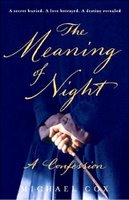 opium dens and brothels.” It’s a book I found in the mail upon my returning from Europe in October, but which I had set aside in order to dig into other volumes demanding my more immediate attention.
opium dens and brothels.” It’s a book I found in the mail upon my returning from Europe in October, but which I had set aside in order to dig into other volumes demanding my more immediate attention.After reading Chris High’s interview with Cox in Shots, though, I may have to move The Meaning of Night up in my stack. Perhaps most intriguing was this question High addresses to the author:
All this makes me realize that the roadblocks (many of them self-created) I have faced in working on my own debut novel are pitifully small. At least I’m not going blind, although I still don’t have several of my plot developments in sight.You had to overcome some serious health issues when writing The Meaning of Night, which resulted in you gradually losing your sight. How did these concerns affect your writing routine and how do they impact on your promotion of the book?
In April 2004, I began to lose my sight as a result of cancer. In preparation for surgery I was prescribed a steroidal drug, one of the effects of which was to initiate a temporary burst of mental and physical energy, which, combined with the realization that the blindness might return if the treatment was not successful, spurred me on finally to begin writing in earnest the novel that I’d been working on sporadically, and to no real purpose, for over thirty years.The immediate benefit was that I lost my inhibitions, creatively speaking. Whereas before I used to agonize constantly, over all sorts of things, now I just wrote, not really caring whether what I was writing was good or bad. And I was now writing regularly, day after day, and well into the night, so that very soon I was amassing a substantial amount of sequential text, instead of endless bits and pieces. The interesting thing was that, when I came off the medication, the words continued to flow: in fact I wrote most of The Meaning of Night without any artificial stimulants whatsoever.
The operation I had in 2004 was successful for a time, but I have now permanently lost the sight in my left eye, and my right eye is under threat until I have further treatment. This certainly makes life difficult; plus I’m back on a low dose of steroids, to keep pressure off the right optic nerve, and so have temporarily put on a good deal of weight. All this has had an impact on what I have to do with regard to promoting the book, but it hasn’t and won’t, stop me doing whatever’s necessary--including a 10-city tour to promote the U.S. edition, published by W.W. Norton on 25 September.

















No comments:
Post a Comment